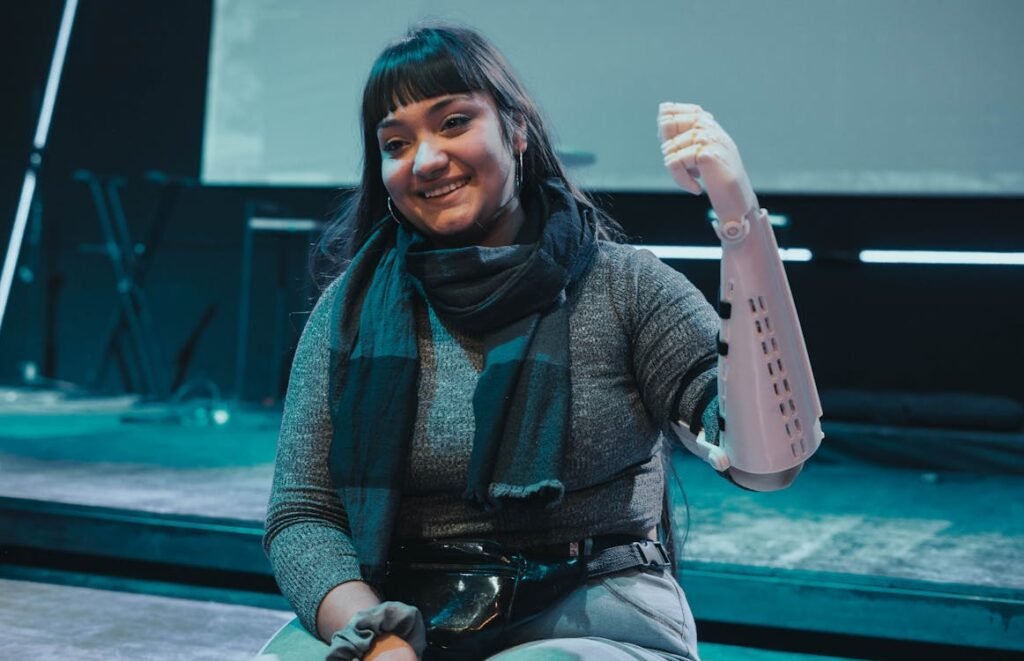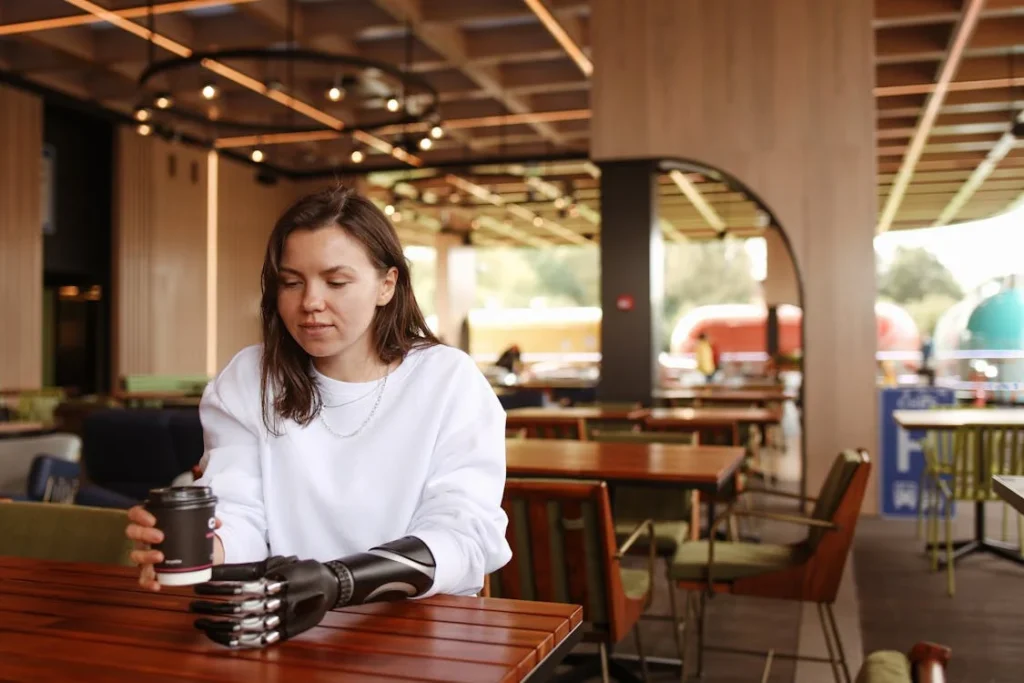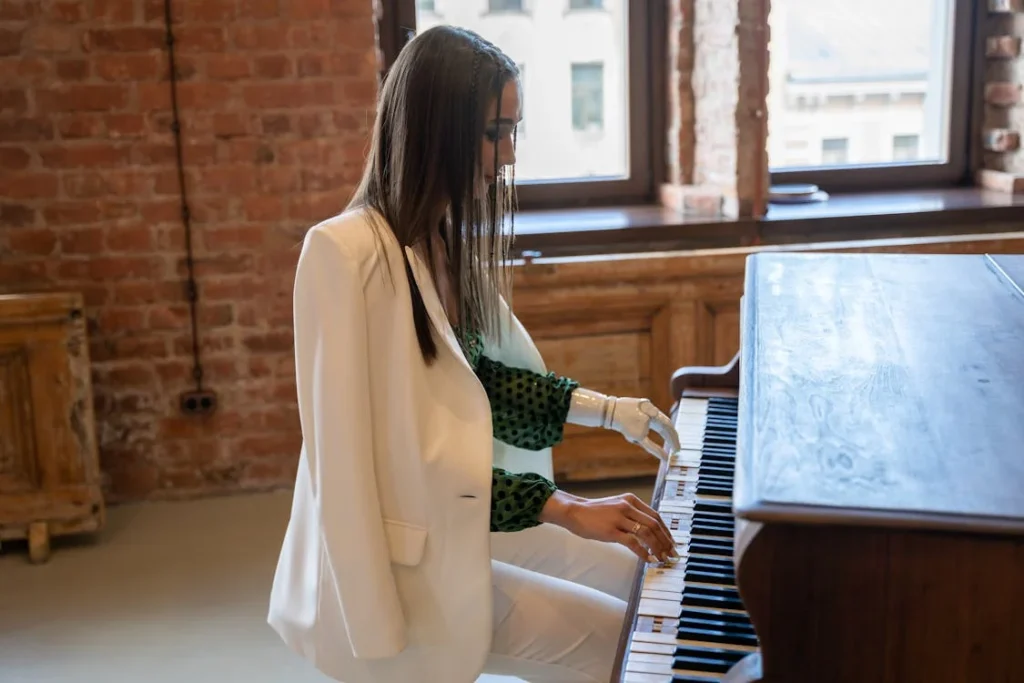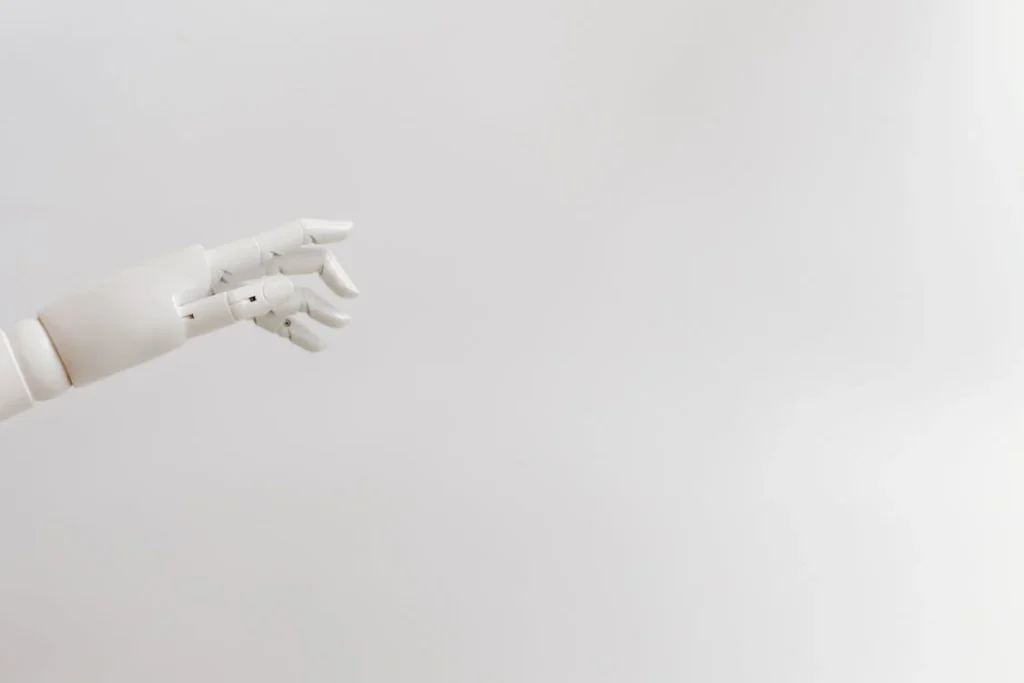Life changes when you lose a hand or are born without one. Simple tasks that once took a second—buttoning a shirt, picking up a spoon, opening a door—can suddenly feel difficult or even out of reach. But that doesn’t mean independence is lost. It doesn’t mean strength is gone. It means it’s time to find a new way forward.
And if you live in Hubli, that new way starts with Robobionics.
We don’t just create artificial limbs—we build smart, intuitive bionic hands that fit your life. Hands that feel natural. Hands that help you do things without needing to stop and think. Hands that work with you, not against you.

Understanding What People in Hubli Truly Need From a Bionic Hand
A City That Moves with Purpose Deserves Technology That Keeps Up
Hubli is a city full of rhythm. From early mornings in bustling vegetable markets to quiet evenings by Unkal Lake, life here moves at its own meaningful pace. People are busy—working, studying, caring for families, and building dreams.
In the middle of this flow, a missing or non-functional hand shouldn’t hold anyone back. Whether you’re a school teacher, mechanic, college student, or retired senior, you deserve the same chance to live fully, comfortably, and independently.
At Robobionics, we spent time listening to users—not in labs, but in their homes, shops, and neighborhoods. We understood that the real problem isn’t just about “replacing” a hand.
It’s about feeling ready to face the day again without hesitation. And to do that, your bionic hand has to work not just in clinics or showrooms, but in real life—in the heat, the dust, the rush, and the small daily decisions that make up life in Hubli.
We know that people here don’t want something showy or overly complex. They want something that feels normal.
A hand that lets them go back to drinking chai, using a mobile phone, helping their kids with homework, or running a shop counter without second-guessing every move. That’s why we’ve built our bionic hands to feel simple, look natural, and perform with quiet strength.
Everyday Movement Should Feel Natural Again
One of the most important things we focus on is ease of use. Many people we met had tried older prosthetic models before. Some were too heavy. Others were confusing.
Some made noises or needed strange movements to work. All of this made the person feel like they were carrying a machine—not a part of themselves.
We’ve changed that completely.
Our bionic hands respond to your body’s natural signals. You don’t need to press buttons or remember steps. If you think about gripping something, the hand does it. If you want to release, it lets go.
This makes tasks like eating, writing, or holding light objects feel smooth and automatic. You don’t need to keep adjusting the hand or worry about what people might think. You just live your life—your way.
People in Hubli have told us they value quiet confidence. They don’t want to draw attention. They just want to feel normal again. And that’s what our hands give them.
The comfort to walk into a shop and pay with confidence. To wave at a friend. To take part in a family function without hiding their hand.
And because our hands are lightweight, breathable, and built for long hours of use, they don’t feel like a burden after wearing them all day.
This is especially important for people who work long shifts, stand for hours, or move between indoor and outdoor tasks. From factory workers to farmers, from teachers to small business owners—we’ve made sure our design supports every role, every routine.
Designed With the Lifestyle of Hubli in Mind
Many global brands build prosthetics for different countries, climates, and cultures. But life in Hubli is unique. Summers are hot. Roads are dusty.
Power cuts are still common in many areas. The food we eat, the way we sit, the way we greet each other—it’s different from life in big cities abroad. And so are our daily needs.
That’s why Robobionics doesn’t import a solution. We build it here, in India, with a deep understanding of local realities. Our bionic hands work without needing constant maintenance.
The battery lasts through full days of activity. The sensors work even when your arm gets a little sweaty. And the grip is firm enough to hold a coconut but gentle enough to pick up a spoon.
We’ve also made sure our support is always close. If you’re in Hubli and something doesn’t feel right, you don’t need to send the hand far away or wait for weeks.
We provide real-time help, quick adjustments, and long-term care—so that you always feel in control. Our users have told us they feel safer knowing we’re nearby, and that they can count on us not just when the hand is new, but even months and years later.
This kind of presence matters. It builds trust. And for something as personal as a prosthetic hand, trust is everything.

Real Lives, Real Results – How Robobionics is Changing Lives in Hubli
From Hesitation to Confidence: The Emotional Shift That Matters Most
When someone first loses the function of their hand—or is born without it—there’s a period of silence. Not always outside, but inside. It shows up as hesitation, as self-doubt. Going out in public feels harder. Interacting with others takes effort.
Even the things you’ve done your whole life—eating with your family, carrying your bag, fixing your shirt—suddenly feel different. What used to feel automatic now becomes a constant reminder of what’s missing.
At Robobionics, we’ve seen this shift happen again and again. But more importantly, we’ve seen what happens after. After someone puts on our bionic hand. After they feel its first smooth grip. After they open and close it just by thinking. That silence inside them? It starts to break.
One of our clients from Keshwapur shared how she hadn’t worn bangles in two years because she didn’t want attention on her hand.
But after getting her Robobionics prosthetic, she wore them again—not just because she could, but because she felt proud. That’s not just a technical win. That’s an emotional victory. And we count those as our biggest achievements.
We’ve helped people in Vidyanagar return to work. We’ve helped students from Deshpande Nagar use laptops again. We’ve helped grandparents near Gokul Road hold their grandchildren with ease.
These aren’t rare stories. They’re happening every week, across Hubli. And they all start with the same thing—a hand that feels like it belongs to you.
A Partner, Not Just a Provider
Most people think of a prosthetics company as a place where you go, get fitted, and walk away. But we’ve turned that idea on its head. Robobionics isn’t just about manufacturing and delivery.
We are your partner in progress. From the moment you contact us to the day you feel fully confident using your hand—and even beyond—we stay with you.
When someone visits us for the first time, we don’t rush. We sit down. We ask questions about their day. What’s easy. What’s hard. What matters to them. A schoolteacher might tell us they want to hold chalk or write on the board.
A shopkeeper may say they want to count notes and open drawers. A tailor might miss the ability to grip thread with one hand while guiding fabric with the other.
These little details shape the design we create. Because it’s not about making a fancy product—it’s about making your life better.
Once your hand is fitted, we walk you through everything gently. You won’t leave unsure. You won’t feel lost. We explain in simple steps how the hand listens to your body, how it charges, how to keep it clean, and how to practice with it until it feels second nature.
But even after that, we check in. A week later. A month later. We send updates. We offer improvements. We fix issues quickly. You never have to chase us—we stay connected.
And this kind of care is why users in Hubli recommend us to others. Because once they experience that level of attention, they know they’re not just a customer. They’re family.
Technology That Understands the Human Body—and Mind
A bionic hand isn’t just about wires and sensors. It’s about creating a bridge between your thoughts and the world around you. When you want to hold something, your mind sends a message to your muscles—even if the hand is no longer there.
Our technology listens to that message. It picks up those tiny movements in your forearm and turns them into actions: gripping, rotating, releasing.
The first time someone sees this happen—when they move their hand without actually “pressing” anything—it feels like magic. But it’s not magic. It’s science, designed with empathy. We don’t just use the latest technology. We use it wisely. We make sure it fits into your routine.
The motor is quiet. The movement is smooth. The battery lasts long. The learning curve is gentle. And the feedback from the hand helps you know exactly what it’s doing—without having to look at it all the time.
This means you can focus on the world around you again, instead of always focusing on the device.
And over time, something special happens: you stop noticing the hand. That’s our goal. We don’t want you thinking about your prosthetic all day. We want you thinking about your life. Your work.
Your dreams. Because when the technology fades into the background, you come to the front. And that’s when true independence begins.

Robobionics and Hubli: A Partnership Rooted in Local Support and Long-Term Care
Why Being Nearby Makes All the Difference
One of the most common problems people face with prosthetic devices is the lack of aftercare. You get the hand, you go home, and then what?
If something doesn’t feel right, if the grip starts to loosen, or if a part needs checking, you’re left waiting. You’re told to call a number or travel far. That gap between receiving the product and getting ongoing support? It breaks trust—and it breaks confidence.
That’s why Robobionics has worked hard to ensure that we’re not just a brand you read about online. We’re present, available, and responsive in places like Hubli.
We’ve created strong systems for follow-up support so users here never feel cut off or left behind. Whether it’s a technical issue, a performance tweak, or just a quick check-up, we make it easy to get help—fast.
Our team regularly visits clients for adjustments and training. We make house calls when needed. We also have a growing network of rehab partners, therapists, and service professionals who work closely with us, right in the city. That means you’re never more than a few kilometers away from the help you need.
We’ve also created a flexible maintenance and care schedule, tailored to different types of users. A shop owner might need a quicker service cycle due to constant use.
A student might need adjustments based on growth. We treat each case individually because your journey with a prosthetic doesn’t end at delivery—it evolves, and we evolve with it.
Training That Builds Skill, Strength, and Self-Belief
Using a bionic hand doesn’t have to be difficult. But it does take time to feel natural. The key is training—and not just the technical kind. Yes, you’ll learn how to open and close the hand, how to charge it, how to clean it.
But the deeper training is emotional. It’s about learning to trust the hand. To rely on it. To believe in it.
That’s why Robobionics offers guided training sessions right from the start. In Hubli, we work one-on-one with users in quiet, supportive settings where they can practice at their own pace.
You won’t be rushed. You won’t be judged. We walk you through the motions. We cheer your small victories. We adjust and readjust until everything feels just right.
We’ve seen users start from barely lifting a cup to confidently tying shoelaces, opening locks, and cooking entire meals. And every time, the moment they stop thinking and just do—that’s the moment we know they’ve made the leap. The hand is no longer “a device.” It’s theirs.
And we don’t stop after the basics. We offer refreshers, advanced tips, and real-life scenario sessions. Need help with holding a pen again? We’ll guide you.
Want to ride your scooter more confidently? We’ll figure out the safest grip together. Every question you have, we’re ready with answers that make sense.
Affordability That Makes High-Quality Bionics Accessible
One major concern people in Hubli share with us is cost. Advanced prosthetics, especially bionic ones, often seem out of reach. Imported models can be too expensive. Cheaper ones often compromise on quality, making the user feel disappointed and stuck.
We’ve taken a different path. We design and build our bionic hands in India. That means no heavy import duties. No middlemen. No inflated costs for branding or packaging. Instead, we focus that budget on function, comfort, and durability.
And because we understand that financial situations vary, we offer custom pricing models. We provide EMI options, flexible payment plans, and support for those applying for government or NGO assistance.
Our goal is simple: if someone in Hubli needs a quality bionic hand, they shouldn’t be held back because of the price tag.
Our pricing reflects our belief that everyone deserves access to world-class care. We’ve built hands for college students using savings. For daily-wage workers through sponsored programs.
For retired citizens using pension support. Each time, the hand may look the same—but the lives it touches are completely unique.
And the moment we hand over that bionic device, knowing it’s been earned through effort, trust, and partnership—that’s a proud moment for us too.

Robobionics in Hubli: Enabling Purpose, Possibility, and Pride
Bringing Dignity Back to Everyday Life
There’s a quiet dignity in being able to do things on your own. Opening a water bottle. Eating without help. Carrying your own groceries. These may sound small, but they build something deep: self-worth.
After losing a hand, many people in Hubli have told us that it wasn’t just mobility they lost—it was the confidence to do simple things without needing someone beside them. It was the confidence to be self-sufficient again.
Robobionics restores that confidence. Our bionic hands do more than respond—they empower. They give people the freedom to complete their routines, take on responsibilities, and show up for others—not as someone being helped, but as someone in control.
That shift is subtle but powerful. It affects how a person walks into a room, speaks to others, and sees themselves.
We’ve seen it happen countless times. A man from Gopanakoppa told us he hadn’t been to the temple on his own in years. After his Robobionics fitting, he not only returned—he started helping others there.
Another user, a home chef in Keshwapur, resumed cooking for local customers after learning how to grip utensils and stir with fluid, steady motion. These stories aren’t about grand transformations. They’re about returning to life—full, ordinary, beautiful life.
Not Just About Ability—About Identity
Living with a disability can often come with an unfair label. People may treat you differently. Some stare. Some avoid eye contact. Some offer help you didn’t ask for. It’s not always cruel—but it’s tiring.
And over time, it chips away at a person’s sense of identity. Who you were before the limb loss, who you still are, gets buried under how others now see you.
That’s why a prosthetic hand isn’t just a tool—it’s a statement. It’s a way of saying, “I’m still me. I still have value. I’m still in this world fully.” Robobionics helps our users reclaim that identity.
Not by hiding their prosthetic, but by using one that feels like them. A hand that blends in when they want it to. That stands out when they choose it to. That works with them, not just for them.
We’ve had users ask for customized finishes to match their skin tone. Others prefer a modern, metallic look that speaks of strength and innovation.
We support both. Because expression matters. And so does control. You deserve to feel proud of every part of your body—including the part you’ve reclaimed through science and design.
Making Robobionics a Part of Hubli’s Progress
Hubli is not standing still. It’s growing, changing, modernizing. New roads are being built. New industries are coming in. Young people are taking risks, starting businesses, and entering global careers.
In this atmosphere of progress, no one should be left behind. Especially not because of a missing hand.
That’s why Robobionics has invested in building a presence within this city’s growth. We don’t operate from a distance. We are engaged.
We hold meetups, training days, awareness drives, and open Q&A sessions so anyone interested—whether for themselves or for a loved one—can come talk to us in person.
We also work with local doctors, clinics, and NGOs to make sure that the path to recovery doesn’t end with healing. It continues with empowerment.
We’ve also seen our users become part of this progress. Some go back to school. Some start home-based businesses. Some begin working in offices or retail shops again.
And some simply return to living with joy, without worry. In every case, Robobionics is not just the starting point—it’s the bridge.
From Possibility to Pride
There’s one word that comes up over and over when we talk to people who use our bionic hands in Hubli: pride. Not in the machine itself, but in what it lets them do.
Pride in picking up a bag of rice from the shop without help. Pride in lighting a diya during festivals. Pride in holding a loved one’s hand with steadiness. Pride in moving through the world with purpose.
That pride is our goal.
We don’t want you to just live—we want you to feel proud of how you live. Proud of your strength, your journey, and your ability to move forward on your own terms.
And every time you use your Robobionics hand, we hope it reminds you: this is not the end of your story. This is a powerful new chapter.

Digital Confidence: How Robobionics Helps Users in Hubli Navigate a Modern, Tech-Driven World
Staying Connected in a Digital India Starts With the Right Tools
India is going digital. And Hubli is no exception. Whether it’s paying for groceries through UPI, booking a train ticket online, managing schoolwork on a tablet, or simply staying in touch with family over WhatsApp—technology is now part of daily life.
But for individuals living with limb difference, this growing dependence on screens and devices can feel like yet another wall to climb.
Tapping, swiping, scrolling, typing—all of it requires precision and coordination. And if a prosthetic hand doesn’t offer that level of control, users find themselves constantly struggling or avoiding devices altogether. In a world that moves through screens, that kind of exclusion can be isolating.
At Robobionics, we believe access to digital tools isn’t a luxury—it’s a right. That’s why our bionic hands are built to handle not only the physical world, but also the virtual one. They aren’t just strong. They’re smart. And they give users in Hubli the ability to navigate technology just like anyone else.
Using Smartphones Shouldn’t Be a Struggle
Mobile phones are lifelines. From local Kirana shopkeepers using payment apps to school students attending online classes—everyone in Hubli touches their phone multiple times a day.
If your prosthetic hand can’t interact with a screen smoothly, that means depending on someone else for even the smallest things.
Our bionic hands are designed with responsive, touch-sensitive finger tips, allowing users to swipe through screens, tap on apps, and even use multi-touch gestures.
Whether it’s scrolling through news in Kannada, checking crop prices, or attending a video call, our users can do it without awkward workarounds or assistance.
One of our users from Navanagar, a college student, shared how he had stopped using his smartphone after losing his hand in an accident. But with his Robobionics hand, he now takes notes, submits assignments, and chats with friends—all independently.
The freedom to use your phone might seem small, but in a digital world, it’s a gateway to education, entertainment, and expression.
Bringing Financial Tools Back Into Your Hands
Digital banking is now the norm. From PayTM to PhonePe, from ATM machines to mobile banking apps—money moves through screens.
But if your prosthetic isn’t precise enough to hold a card, tap a screen, or type a PIN, you’re left asking for help every time you need to make a simple transaction.
That’s why our users in Hubli are equipped with grips stable enough to hold bank cards and dexterity fine enough to type PINs or operate fingerprint scanners.
We’ve trained users to hold cash, use ATMs, and operate self-checkout kiosks confidently. Even QR code scanning, often thought of as a “two-hand” task, becomes easy when your bionic hand responds instantly to your intent.
A shopkeeper near Bhavani Nagar told us that before getting our prosthetic, he often avoided digital payments because he didn’t want customers to notice his struggle. Now, he accepts UPI payments with pride. The hand no longer slows him down—it supports his business.
Learning and Work Become Accessible Again
Modern jobs and education rely on digital literacy. Typing, using a mouse, navigating learning platforms—these are not optional anymore.
Children in school, teens in college, and professionals in offices all need to use screens fluently. A slow or non-responsive prosthetic can cause delays, frustration, or even lost opportunities.
That’s why Robobionics bionic hands are designed for digital fluency. The fingertips respond to light muscle signals, allowing users to press keys, click buttons, and even use tools like styluses or touchscreen pens.
The grip is stable, but never stiff, meaning users can adjust between delicate tasks—like typing passwords—and broader tasks—like using a touchpad or navigating a desktop.
One IT technician in Old Hubli, after years of depending on help for typing, is now managing entire system dashboards with his bionic hand.
He shared that he no longer avoids work calls or video meetings, because he’s confident he can handle whatever’s needed—fast, accurately, and without drawing attention to his hand.
That’s not just function. That’s freedom at work.
Smart Homes, Smart Devices—Now for Everyone
As Hubli modernizes, more homes are getting smarter—automated lights, smart TVs, virtual assistants like Alexa or Google Home.
These tools often require quick hand control, whether it’s a tap on a remote, a swipe on a tablet, or holding a voice button. Our prosthetics are ready for that world.
We’ve helped users connect with their devices and feel confident using home technology again. Whether it’s flipping through channels, adjusting the volume on Bluetooth speakers, or using voice commands through subtle gestures, the hand doesn’t stand in the way. It opens the door to full participation in modern living.
This integration matters. Because when you feel left out of everyday progress, you stop participating. But when your hand helps you engage with it smoothly, you feel included—not just in your home, but in your city’s digital future.

Beyond the User: How Robobionics Supports Families and Caregivers in Hubli
When One Person Is Affected, the Whole Family Feels It
Losing a hand or living without one isn’t something that happens in isolation. In most homes in Hubli, life is tightly knit—families live together, support each other, and share responsibilities. So when one member loses mobility, it impacts everyone around them.
Suddenly, a parent starts needing help with small tasks. A spouse becomes the full-time supporter. A child begins picking up chores before they even understand why. These shifts, though made with love, often carry unspoken stress.
Over time, the emotional and physical pressure builds. It’s not just about work—it’s about watching someone you love struggle and not knowing how to help.
At Robobionics, we’ve seen these invisible burdens. That’s why we build prosthetics not just for the individual—but for the family that stands behind them.
Restoring Balance in the Home
The return of a functioning hand doesn’t just change one person’s experience. It restores balance to the entire home. Tasks that were once divided awkwardly become natural again.
A husband can tie his own shirt cuffs. A grandmother can hold her own cup of tea. A teenager can zip their bag without calling for help. The little moments where family members used to quietly step in—those begin to disappear.
We’ve had spouses tell us, “He finally asked me how my day was again.” Not because he didn’t care before, but because now he had the space—mentally and emotionally—to think beyond just managing his own needs.
That shift is profound. It means the entire household begins to feel lighter. Not just practically, but emotionally. Robobionics brings back that space—where care becomes love again, not a full-time job.
Empowering Caregivers With Understanding and Tools
One of the most under-served groups in prosthetic care is the caregiver. Whether it’s a daughter helping her father, a wife assisting her husband, or a sibling guiding a younger brother—they often take on huge responsibility with little training, little guidance, and even less emotional support.
At Robobionics, we change that.
We actively involve caregivers in every stage of the process. During fittings, we teach them how to help without hovering. During training, we show them how to coach without correcting. And over time, we help them step back—so that their support builds strength, not dependence.
Many caregivers in Hubli have told us they feel more confident—not just because the hand works, but because they understand it. They know how to clean it, how to charge it, how to help practice gestures in a way that builds rhythm, not frustration. They stop feeling helpless, and start feeling useful in the right way.
And when caregivers feel equipped, their energy changes. They’re no longer on edge. They’re more hopeful. They look forward to what’s next, instead of fearing what might go wrong.
Creating Moments of Shared Joy Again
One of the most moving changes we witness is when simple shared experiences return. A mother and daughter cooking together again. A grandfather and grandson gardening. A young couple going out without hesitation—hand in hand, without a second thought.
These are not technical outcomes. They’re emotional victories.
We’ve seen this happen across Hubli. A wife who no longer rushes to help her husband with every tiny task. A father who feels proud watching his child handle independence. A grandmother who joins family events again, holding a plate, sitting freely, laughing fully.
When users feel capable again, families feel whole again.
And that is a different kind of healing—one that goes far beyond medicine or machinery.
A Support System That Stays Involved
Robobionics doesn’t walk away after delivering the product. We stay engaged—with both users and their support systems. We invite families to training sessions.
We create caregiver handbooks. We host meetups where spouses, parents, and even siblings share what they’re experiencing, and how to better support one another.
In Hubli, where family is everything, this approach matters.
Our goal isn’t just to empower one individual. It’s to rebuild a unit of support around them that is proud, informed, and emotionally strong. Because when families grow stronger, confidence multiplies. And when confidence grows, everything changes—for everyone.
Conclusion
In a vibrant city like Hubli, life doesn’t slow down. And neither should you. Whether you’re rebuilding your routine, returning to work, reconnecting with family, or simply regaining your confidence, Robobionics is here to walk beside you—not just with technology, but with heart.
We don’t just build prosthetic bionic hands. We build tools for independence, for dignity, for hope. Every design choice, every fitting, every follow-up is made with one purpose: to help you live freely and fully again.
From students to seniors, homemakers to professionals, we’ve helped people across Hubli move past fear and into freedom. We’ve supported families, strengthened caregivers, and created stories of strength every single day.
Because your journey isn’t just about adapting—it’s about thriving.
And with Robobionics, you’re not just getting the best prosthetic hand—you’re starting a new chapter, with a partner who sees the human before the hardware.
Let’s build your future—one strong, confident step at a time.



